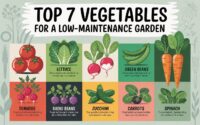Vegetables That Boost Immunity: Grow Your Own Medicine
Published: 2025-10-18
Why Grow Immunity-Boosting Vegetables at Home
Growing your own vegetables offers more than just fresh produce. It gives you control over what goes into your food. When vegetables are grown organically, they retain more nutrients. These nutrients play a vital role in strengthening your immune system.
Moreover, homegrown vegetables are free from harmful pesticides. They are harvested at peak ripeness. This means they contain higher levels of antioxidants and vitamins. Therefore, your body receives maximum benefit.
Top Immunity-Boosting Vegetables to Grow
Certain vegetables are known for their immune-enhancing properties. These vegetables contain vitamins, minerals, and antioxidants that help fight infections. Let’s explore the best options to grow in your garden.
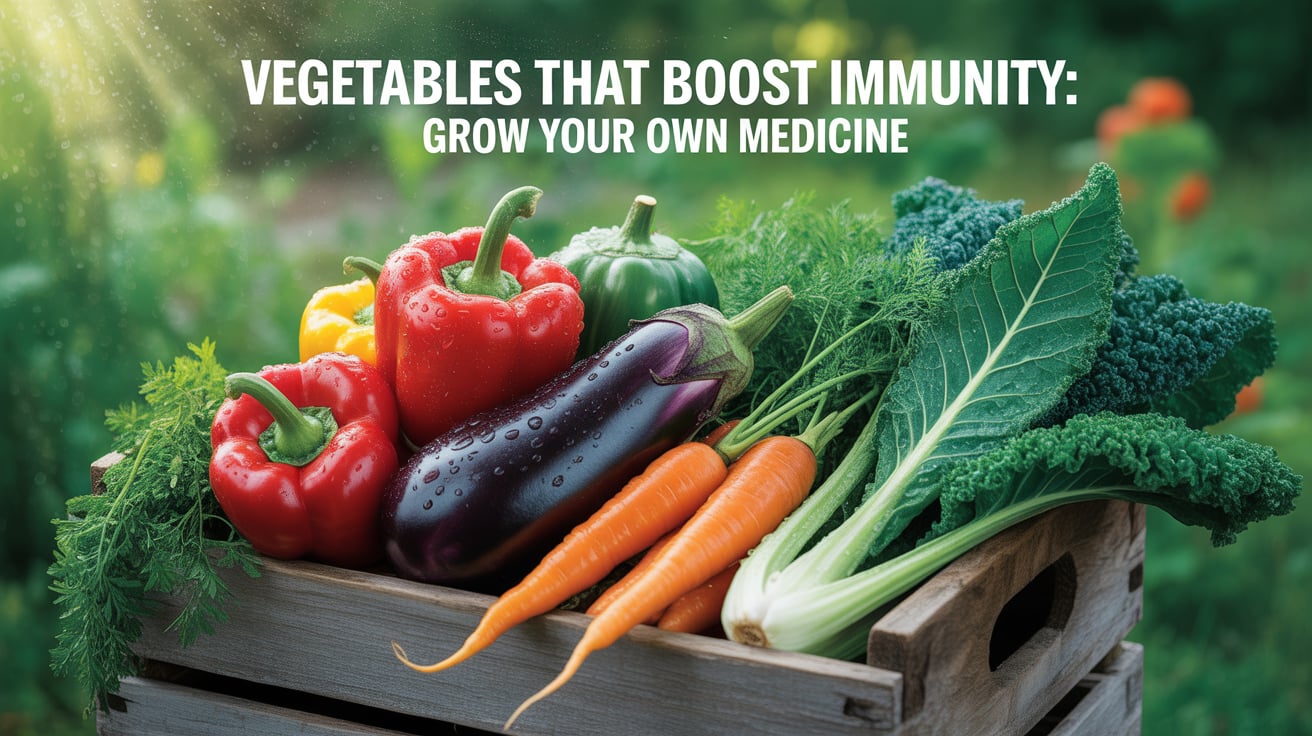
Garlic
Garlic is a powerful natural antibiotic. It contains allicin, which boosts white blood cell activity. This helps your body fight viruses and bacteria.
- Plant cloves in well-drained soil
- Water moderately
- Harvest when leaves turn yellow
- Garlic is easy to grow and stores well. It can be used in soups, sauces, and teas.
Spinach
Spinach is rich in vitamin C, beta-carotene, and antioxidants. These nutrients increase immune cell function.
Growing tips:
- Sow seeds in cool weather
- Keep soil moist
- Harvest young leaves for best taste
Spinach grows quickly and can be harvested multiple times.
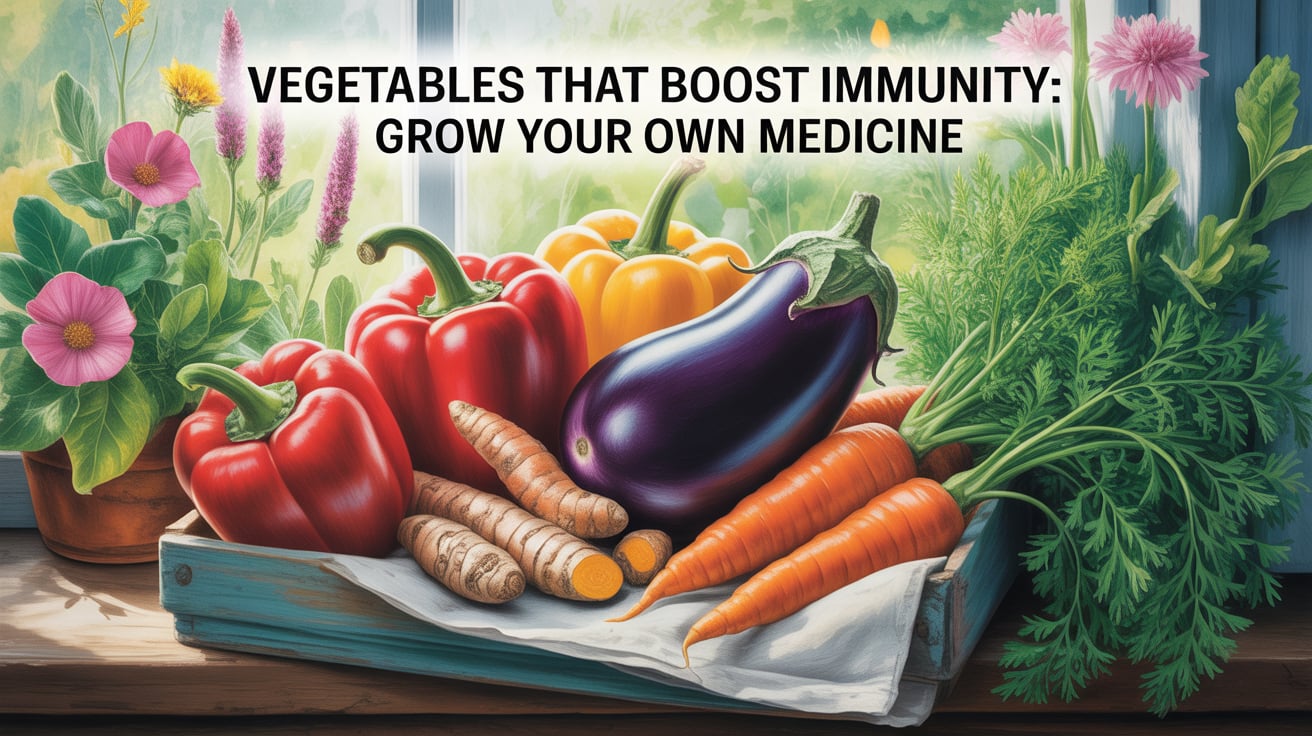
Broccoli
Broccoli is packed with vitamins A, C, and E. It also contains sulforaphane, which has anti-inflammatory effects.
- Plant in early spring or fall
- Use compost-rich soil
- Protect from cabbage worms
Steamed broccoli retains most of its nutrients. It pairs well with garlic and lemon.
Carrots
Carrots are high in beta-carotene. This converts to vitamin A, which supports mucous membranes and immune response.
Growing tips:
- Sow seeds in loose soil
- Thin seedlings for proper growth
- Water regularly
Carrots can be eaten raw, roasted, or juiced.
Sweet Potatoes
Sweet potatoes are loaded with antioxidants and vitamin A. They help protect against infections and support skin health.
Growing tips:
- Use slips (sprouted shoots) for planting
- Provide full sun
- Harvest after 90–120 days
They store well and make a nutritious addition to meals.
Kale
Kale is a superfood with high levels of vitamin C and flavonoids. It boosts immune function and reduces inflammation.
Growing tips:
- Plant in cool weather
- Harvest outer leaves first
- Protect from aphids
Kale can be used in salads, smoothies, and soups.
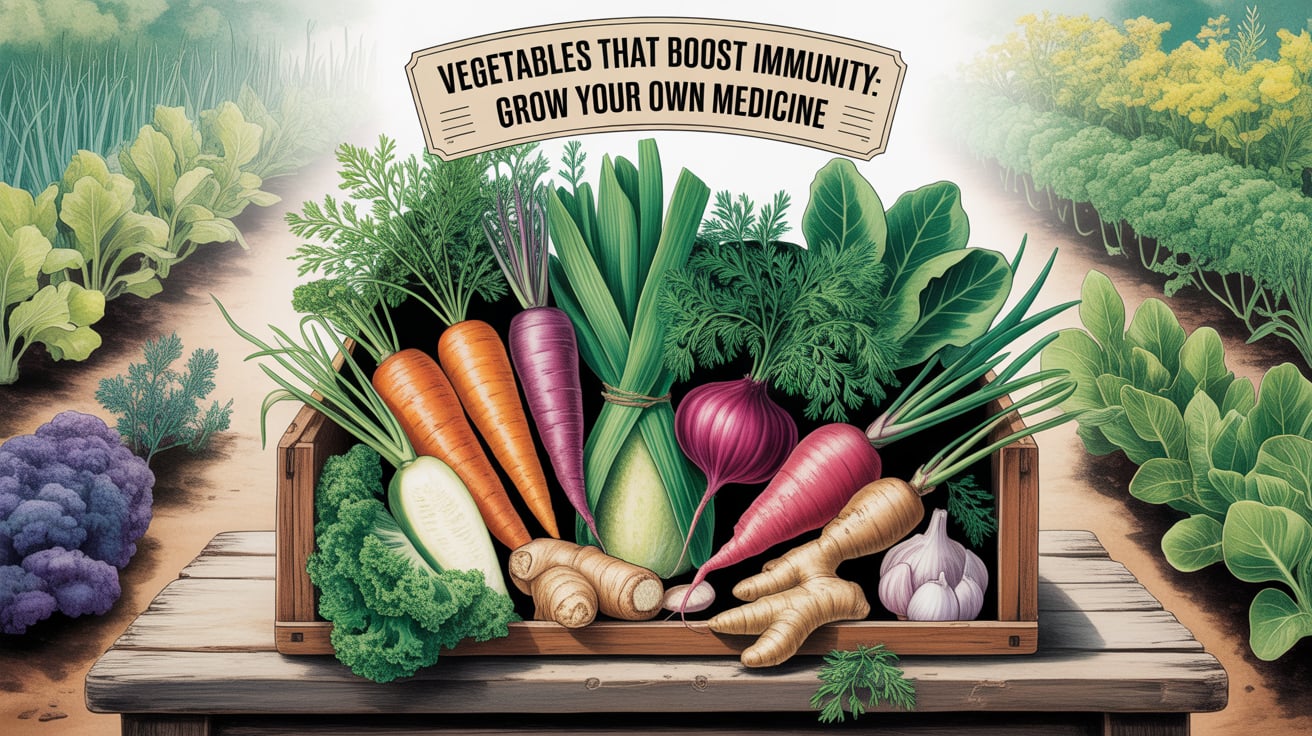
Bell Peppers
Bell peppers contain more vitamin C than oranges. They also offer beta-carotene and antioxidants.
Growing tips:
- Start seeds indoors
- Transplant after frost
- Provide full sun
Red and yellow peppers are especially rich in nutrients.
| Tomatoes |
|---|
Tomatoes are rich in lycopene and vitamin C. These compounds help fight oxidative stress and support immunity. |
Growing tips:
- Choose disease-resistant varieties
- Stake or cage plants
- Water deeply and regularly
Tomatoes are versatile and can be used in sauces, salads, and juices.
Onions
Onions contain quercetin, a powerful antioxidant. They also have antibacterial properties.
Growing tips:
- Plant bulbs in early spring
- Keep soil loose
- Harvest when tops fall over
Onions enhance flavor and health in many dishes.
Beets
Beets are high in folate and antioxidants. They support detoxification and immune cell production.
Growing tips:
- Sow seeds directly in soil
- Thin seedlings
- Harvest when roots are 2–3 inches wide
Beets can be roasted, juiced, or pickled.
How These Vegetables Support Your Immune System
Each vegetable contributes to immunity in unique ways. Some stimulate white blood cells. Others reduce inflammation. Many provide antioxidants that protect cells from damage.
For example:
- Vitamin C boosts immune cell activity
- Vitamin A supports mucous membranes
- Antioxidants neutralize free radicals
- Fiber improves gut health, which is linked to immunity
Eating a variety of these vegetables ensures a balanced intake of nutrients.
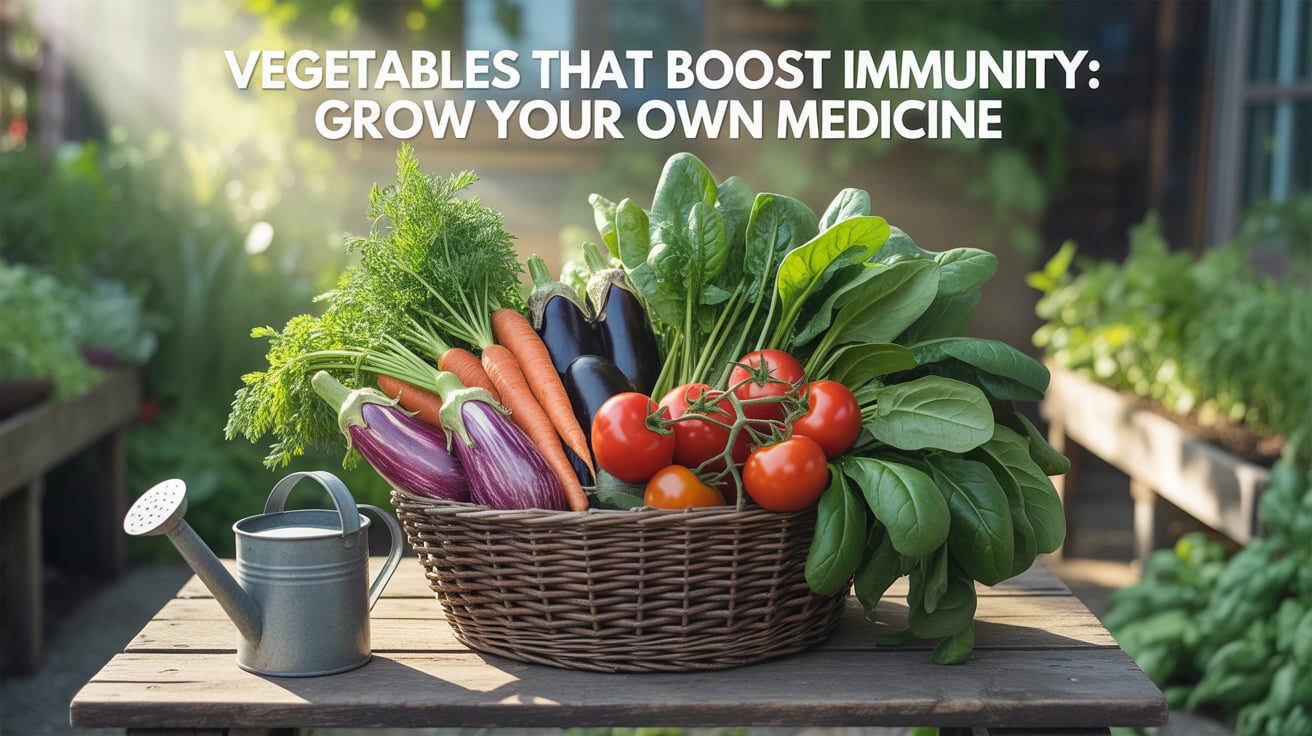
Best Practices for Growing Immunity Vegetables
To maximize benefits, follow these gardening tips:
- Use organic compost to enrich soil
- Rotate crops to prevent disease
- Water early in the day
- Avoid overcrowding plants
- Inspect regularly for pests
Healthy plants produce nutrient-rich vegetables. Therefore, garden care is essential.
Seasonal Planting Guide
Timing matters when growing vegetables. Here’s a seasonal guide:
| Season | Vegetables to Plant |
|---|---|
| Spring | Spinach, carrots, onions, broccoli |
| Summer | Tomatoes, bell peppers, sweet potatoes |
| Fall | Kale, garlic, beets |
| Winter | Indoor herbs, microgreens |
Sources:
Natural Fertilizers for Immunity Vegetables
Chemical fertilizers can harm soil and health. Natural options are safer and more effective.
- Compost: Adds nutrients and improves soil texture
- Worm castings: Rich in beneficial microbes
- Banana peel tea: Provides potassium and phosphorus
- Eggshells: Add calcium to soil
Apply these regularly for strong plant growth.
Pest Control Without Chemicals
Pests can damage your crops. However, natural methods work well.
- Use neem oil spray
- Plant marigolds to repel insects
- Introduce ladybugs and lacewings
- Use row covers and mulch
These methods protect your garden and keep vegetables safe.
Harvesting and Storing for Maximum Nutrition
Harvest vegetables at peak ripeness. This ensures maximum nutrient content.
- Pick leafy greens early in the morning
- Store root vegetables in cool, dark places
- Use breathable containers
- Avoid washing until ready to use
Proper storage preserves vitamins and flavor.
Recipes Using Immunity Vegetables
Eating these vegetables regularly boosts immunity. Try these simple recipes:
Garlic Spinach Stir-Fry
- Sauté garlic in olive oil
- Add spinach and cook until wilted
- Season with salt and pepper
Roasted Beet and Carrot Salad
- Roast beets and carrots
- Toss with lemon juice and herbs
- Add chopped onions and kale
Sweet Potato Soup
- Boil sweet potatoes with onions and garlic
- Blend until smooth
- Add spices and serve warm
These meals are delicious and immune-friendly.
FAQs
Garlic, spinach, broccoli, and sweet potatoes are among the top choices.
Yes, many vegetables like kale, carrots, and tomatoes grow well in pots.
Daily consumption is ideal for consistent immune support.
Yes, they are safe and beneficial for all age groups.
Natural compost and organic fertilizers are recommended for best results.

- Be Respectful
- Stay Relevant
- Stay Positive
- True Feedback
- Encourage Discussion
- Avoid Spamming
- No Fake News
- Don't Copy-Paste
- No Personal Attacks



- Be Respectful
- Stay Relevant
- Stay Positive
- True Feedback
- Encourage Discussion
- Avoid Spamming
- No Fake News
- Don't Copy-Paste
- No Personal Attacks


